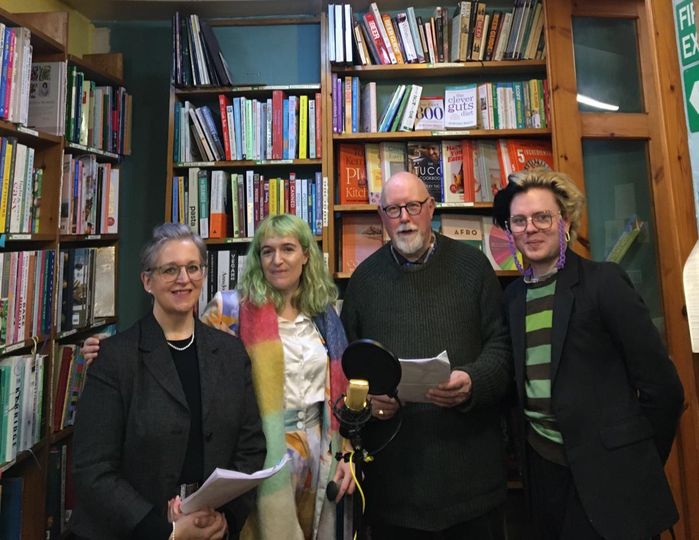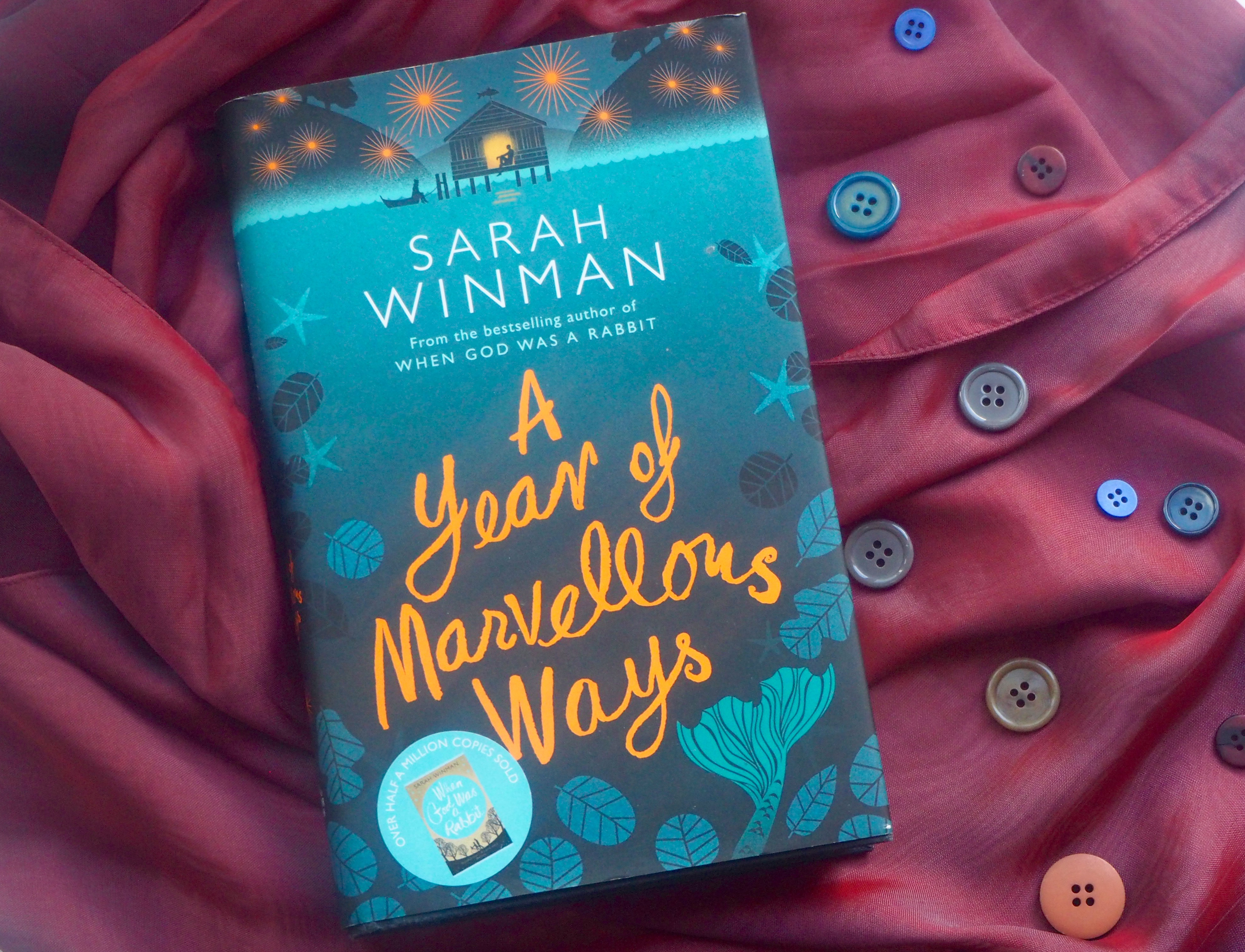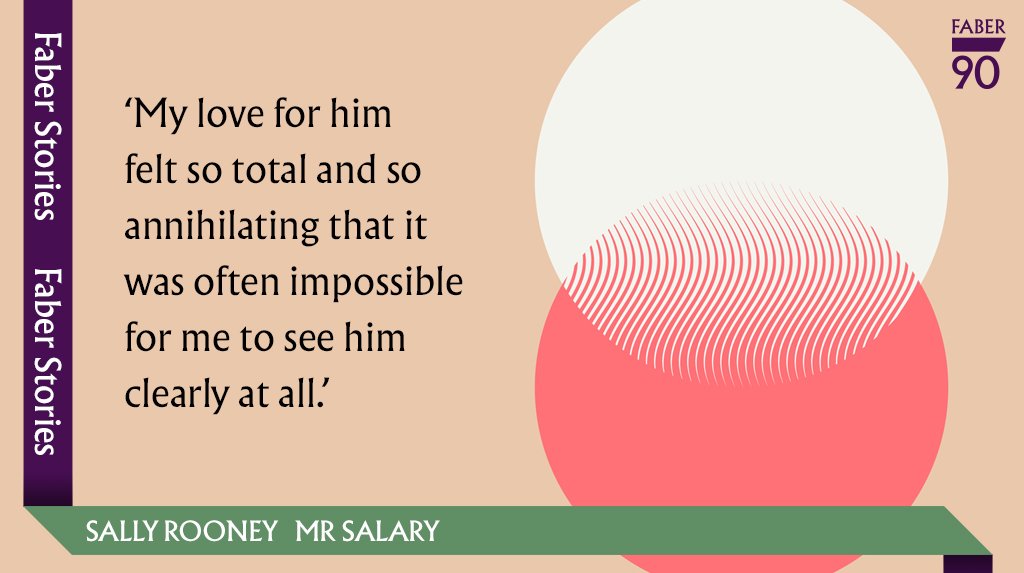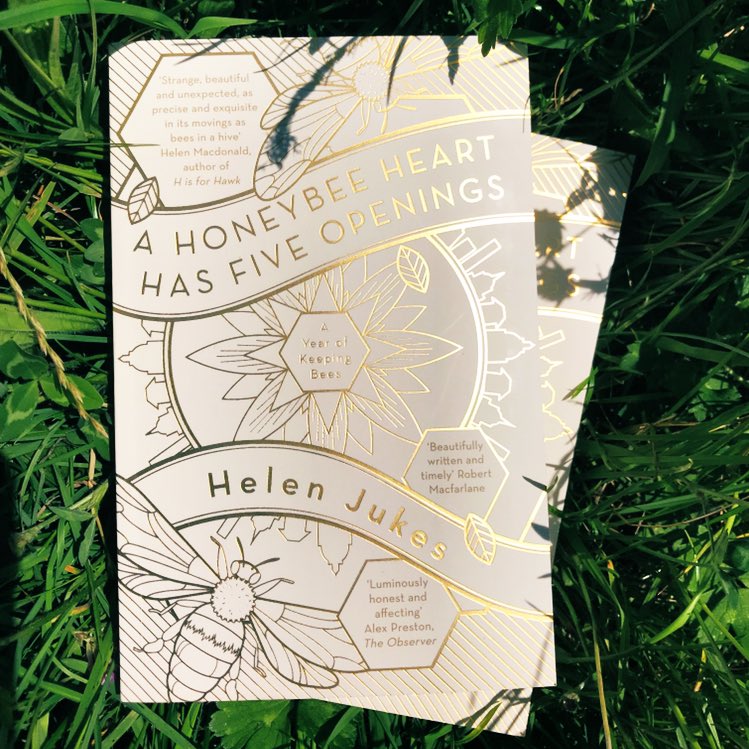“Voice” at Scarthin Books
November 2023 was the 80th anniversary of the publication of Talking to India edited by George Orwell. To commemorate that and Orwell’s contribution to the broadcasting of poetry, we at Scarthin Books re-enacted an episode of “Voice”, the epoch-making poetry magazine programme by which Orwell introduced the format to the air.

And here it is – listen again to our recreation of “Voice”, children’s literature edition, as first broadcast on the BBC Eastern Service in October 1942.
The photograph shows (L- R) Jill Gossling, Charlotte Lunn, Les Hurst, Henry Fothergill.
Thanks to David Mitchell of Scarthin Books, and to Quentin Kopp of the Orwell Society for their support.
– – – – – – – – – – – – – – – – – – – – – – – – – – – – – – – – – – – – – – – – – – – – – – – – – – – – – – – –
Lattice Labyrinth Tessellations – Mathematical giftwrap

The designs of giftwrap newly for sale in Scarthin Books are each made up of shapes that keep repeating for ever, theoretically covering the infinite plane. Such patterns are called tilings or tessellations of the plane. I hit upon the idea for the highly symmetrical intricate designs I call Lattice Labyrinths one evening in 1969 or 1970, whilst doodling in connection with my Birmingham Ph.D. research on “Some aspects of demand-actuated public transport systems” carried out by night (and occasionally by day) using a paper-tape fed Elliott Automation computer with 8, later16, kilobytes of storage. I often left it to run all night (often finding it stuck in a loop). The basic ideas are rather implausibly inserted into my 1972 thesis, but then life in Derbyshire took other courses. I did make time for another go at ”tessellating” round about 1990, working while baby-sitting or escaping to other people’s houses and to a croft on Skye, expounding the theory and practice on hand-coloured illustrated A3 sheets. These was sent off to the co-author of the standard work on tilings, Professor G.C.Shephard, who made valuable corrections of logic and nomenclature but gave not a word of encouragement – or discouragement.

It was not until semi-retirement in 2009 (after 40 years worrying that someone else would get there first) that I got stuck in again, (pestered by jocular IT specialist Mike Susko) this time using Microsoft Word and Adobe Illustrator. Highlights of this campaign were writing a short how-to-do-it workbook for educational maths publisher Tarquin (on sale in the shop) and getting a paper accepted for the 2014 Bridges Conference on Mathematics and the Arts, held in Seoul, South Korea. This was a great treat. The International Congress of Mathematicians was taking place nearby, so the Bridges Conference plenary sessions and seminars were graced by some of the world’s outstanding practitioners, including Harvard’s brilliant mathematician and musician Naom Elkies, the flamboyant Fields medallist Cédric Villani (now also a French politician!) and Finnish virtuoso-juggling professor Harri Varpanen.

But what to do next? Another paper? (but in what journal) Complete a “big book”? Exhibit in galleries? (how to get a foot in the door) Produce textile designs? (need a graphic artist collaborator) Give talks at universities and art colleges? (they don’t reply). And what about Family, including a special-needs child, bookshop, moutainside garden and village events? What I actually did was throw myself into blogging, as a way to propagate the techniques. But most of the blog posts fell on stony ground (but see shade structure and Star Wars Day images) so I seem to have given that up and am now trying to finish the Big Book, which doesn’t require me to be pushy, is enjoyable and is a good way to keep learning. I’ve twice exhibited in the Wirksworth Festival Art and Architecture trail, pegging out 2.4 metres square boards to hold designs made up of hundreds of squares or triangles cut from medium density fibreboard by joiner friend Jacob Butler and coloured with magnetic paint for easy adjustment. Children loved interacting – soon transmuting the fringes of my own so-serious designs into their own extemporary shapes. No invitations from galleries, alas, but a visitor told me of MathsJam, a British, now worldwide, network – groups meet in pubs on the third Tuesday in each month to solve puzzles and play mathematical games. The nearest is in Nottingham and I’ve also given three breathless five-minute papers to the annual MathsJam get-together, at a conference centre near Stone, Staffs.

Suddenly, here in 2022, the same Mike who pestered me to get on with it a decade ago announced that he (also in the midst of busy day jobs) had finally found time to crack coding construction of the first-found family of Lattice Labyrinths. You just feed in two numbers and hey presto! Hence the sudden appearance of the giftwrap –initially two design printed in Derby a few years ago plus four new short-run oprints, three by Mike. And they are selling quite well! Presumably not only to mathematics enthusiasts. We’ll do some more, and await invitations !?
Dave Mitchell
 (May the fourth be with you)
(May the fourth be with you)
– – – – – – – – – – – – – – – – – – – – – – – – – – – – – – – – – – – – – – – – – – – – – – – – – – – – – – – – – –

Simon Marshall – Bookseller, blogger @veryrareSimon
Blogs are a book’s best friend ~ Simon Marshall: Wednesday bookseller, resident top-shelf reacher
Our third installment in a regular update on recent titles, golden oldies and Scarthin quirks and curiosities.
Spring, 2020
Reflecting, reimagining, respecting
 Pedro Luis Ajuriaguerra Saiz won the Chartered Institute of Building’s 2019 Art of Building photography competition with his stunning picture of the City of Arts and Sciences in Valencia, Spain.
Pedro Luis Ajuriaguerra Saiz won the Chartered Institute of Building’s 2019 Art of Building photography competition with his stunning picture of the City of Arts and Sciences in Valencia, Spain.
Judges praised his photo of the magnificent building, which though charismatic and impressive in the day, truly comes alive at night, when it reveals its true form – one half of a fish.
‘Due to the reflection of the water at night, the architecture of the buildings shows us the figure of a fish, perhaps prehistoric, with its heart still alive.’
In capturing this building in its full, surreal potential, Saiz actively presents a building reimagining itself.
Scarthin Books is a bit of a reimagining too.
It was a house, reimagined as a bookshop – room by room until the proprietors had no choice but to buy the house next door. Scarthin overlooks the idyllic Mill Pond, which only became so idyllic-looking in the past few decades, reimagined from a stretch of scrubland, featuring an abundance of litter and an absence of swans.
I have reimagining on the brain. Recently, Greta Gerwig’s film adaptation of the period classic ‘Little Women’ did a startling job of bringing its Civil War American characters cultural currency today. Having recently found secondhand copies of ‘Little Men’ Louisa May Alcott’s sequel(!) including a rare 1837 edition, on our shelves, it’s always exciting as a bookseller to hear titles that used to be requested with some tiredness, new energy and verve. I personally feel in swapping the narrative to non-linear, and allowing the girls’ childish wants to run concurrent with their adult realities, the electric, feminist currents in the writing are writ large and mighty.
Soon ‘The Personal History of David Copperfield’ hits screens, reimagined with a non-white protagonist and all the cartoonish dynamics of Charles Dickens’ worlds brought into full colour and energy. One can only hope we may enjoy a resurgence in interest in Dickens as a eccentric take on underdog narratives, rather than stale, bleak depictions of grubby London.
 I’m currently working on a version of Robert Louis Stevenson’s ‘Treasure Island’ with primary school children, reimagined as a group of young people defending their den, and in-turn their imaginations, from their dismissive peers. Young people’s concentration thrives in fits and starts, variety and excitement, and so building the script episodically has benefitted their ways in and out of the drama.
I’m currently working on a version of Robert Louis Stevenson’s ‘Treasure Island’ with primary school children, reimagined as a group of young people defending their den, and in-turn their imaginations, from their dismissive peers. Young people’s concentration thrives in fits and starts, variety and excitement, and so building the script episodically has benefitted their ways in and out of the drama.
Too, with novels, I find that chance to accumulate interest and leave breathing space for the imagination to reflect, make connections and doubts amongst the plot offers a richer, more engaging reading experience.
Episodic structures in fiction books allow for the intense investments garnered by short stories, but within the same world-building framework of a full-length novel. When reading ‘The Travelers’ by Regina Porter, I found the careful introduction and development of characters across generations of two families in America greatly involving. Being able to finish a chapter, and in a sense finish your time with that family, and their opinion, only to find it reflected, or inverted or distorted elsewhere in the book.
The echoes of how race impacts and silence warps families is fascinating, raising the stakes with each new iteration of a family unit introduced in the text.
Race, silence and frank accounts of sex underpin the drama in ‘Queenie’ released last year, and heralded as ‘the black Bridget Jones’. One problem when we only see new work as a reimagining is that we don’t let something stand in its originality. For Candice Carty Williams’ book to be allowed to exist as it is, a fresh powerful piece of contemporary fiction, we need more black female voices making it into the mainstream to stand alongside it, not as exceptions, but just exceptional works of fiction. The Booker-prize winning ‘Girl, Woman, Other’ by Bernardine Evaristo proves that there is an appetite for heavy-hitting, diverse work, both critically and publically, and respects this state of things.
We often need to understand things as in relationship to each other to best process them, but too, remembering that not everything must be ‘the new Fleabag’ or ‘the black Bridget Jones’ frees us from shutting out possibilities – books may be in conversation, or constellation with each other. Or some may take inspiration and go entirely their own way.
Madeline Miller’s ‘Circe’ even reveals more than its foundation, with a Greek Myth fleshed out and urgent, Miller not only brings known characters into being, but ensures their ‘hearts are still alive’ too.
Like the City of Arts and Sciences – there are so many books that are great works themselves, and then in the right light, reveal a whole other half of themselves to make up a whole picture. Whether that be through the perspective of reinvention, the sudden volume of a new voice, or simply being part of a much greater, more powerful whole – each demonstrates the new life one can bring from seemingly out of the blue.
Books mentioned (and where to find them):
Little Women by Louisa May Alcott – (Ground-floor New Fiction)
Little Men by Louisa May Alcott – (Ground-floor Secondhand Fiction)
The Adventures of David Copperfield by Charles Dickens – (Ground-floor Secondhand Fiction)
Treasure Island by Robert Louis Stevenson – (Ground-floor Secondhand Fiction)
The Travelers by Regina Porter – (Hardback available to order, paperback due September)
Queenie by Candice Carty Williams – (Ground-floor New Fiction)
Girl, Woman, Other by Bernardine Evaristo – (Ground-floor New Hardback Fiction)
Circe by Madeline Miller – (Ground-floor New Fiction)
Autumn, 2019
Going offline: Songs of Waking (and resting)
 The nights don’t just draw in here, they charcoal. If like me you’re starting to feel the hibernation instincts kicking in, the colder months could be all about best equipping yourself for a time of rest ahead.
The nights don’t just draw in here, they charcoal. If like me you’re starting to feel the hibernation instincts kicking in, the colder months could be all about best equipping yourself for a time of rest ahead.
Our rural setting provides an idyllic spot for crisp Autumn days – often customers ask to eat their lunches from the café on the Prom, as the sunlight flexes on the water.

I find the best books to properly transport me involve water as a key theme or setting. ‘A Year Of Marvellous Ways’ by Sarah Winman is a fall-back book of mine – I bought it instinctively in a bookshop in Dartmouth and find its dreamy description of Cornwall calming and absorbing. It meanders in and out of folklore and memory towards a bittersweet place of peace for its characters. Winman paints a decidedly offline landscape, which cuts out excess noise or busyness, instead allowing nature to flourish as both setting and an active character itself.
Our bookshop is a pretty offline landscape too. There’s no iPads or self-service. I’ve had customers say ‘I’m just going to turn my phone on silent to enjoy this’ – they sense a vibe. You’re more likely to overhear someone playing piano in the secret garden room than the whistles and clicks of smartphones in dialogue. People quite like feeling off the grid here. And anyway, our wifi’s awful.
Our relationship with offline publisher Analog Sea began by stocking their melodic book of poetry ‘Songs of Waking’ by founder Jonathan Simons. We’ve since fallen a little in love with them, also offering their journal and commonplace book.
 In the words of Analog Sea “As an offline publisher, we want to preserve as much human contact as possible, and we work hard to distribute our books through the physical bookstores we love and support.”
In the words of Analog Sea “As an offline publisher, we want to preserve as much human contact as possible, and we work hard to distribute our books through the physical bookstores we love and support.”
They encourage correspondence by letter rather than email, and also value the importance of the physical exchange when sharing books. We had Jonathan Simons speak at Scarthin on the 22nd November on the importance of offline publishing, discussing what it means to have human librarians, booksellers, and professional writers working within a community, and what the impact of their disappearance might be. We let technology flood into our lives for convenience, and then are surprised when we no longer recognise the landscape around us.
As mentioned in the last blogpost, the active move towards ‘traditional’ respites – be it hobbies or hygge – is indicative of a craving for tangible connection. One that lasts beyond the limits of a notification dopamine rush.
That need not mean that relaxation always be slow. A chapter of a book on a bus, a poem each night before bed. A short story. We often say we ‘don’t have time to read’ but what we really mean is, ‘I’ve not found something to read that fits into the pace of my day.’
It can be that short stories are written off as an inferior form, as not deeply involving, but that need not be true. What we consume elsewhere has never been briefer – if anything we seem thirsty for concision. How can that be better paired with a swift and precise impact?
For Faber’s 90th birthday, they released a collection of short stories by acclaimed authors past and present – trending names such as Sally Rooney (Mr Salary) proving that it remains a contemporary medium; what sharp insight can be shared that quickly.
Kate Clanchy touches on this in the review of short story collection ‘Sudden Traveler’ by Sarah Hall, observing she ‘is an exceptional writer who can expose the animal in us all, yet some of her new stories are surprisingly soothing.’
Despite the sinister topics of her dark magical realism, there is something particularly enchanting about being escorted to these realities. Safely viewing them from your own vantage point, like winter gales from a bedroom window.
Our mighty manager David, and many of the Scarthin staff are huge fans of Haruki Murakami – the Japanese author famed for his surreal ways in and out of the human psyche.
Why not curl up with Murakami’s ‘Hard-Boiled Wonderland and the End of the World’ over December, ready to join our book club on the 27th January?
Come connect with other bibliophiles, in a friendly offline setting, when the darkest days of Winter are over. In a busy, hyperconnected world, it’s always good to carve out pockets of time with likeminded folk where the stakes are low, the tea is hot and the conversation is flowing.
We’ll make our own little analog oasis this way.
Books mentioned (and where to find them):
A Year Of Marvellous Ways by Sarah Winman (Ground-Floor New Fiction)
Songs of Waking’ by Jonathan Simons (Ground-floor Display Cabinet)
Mr Salary by Sally Rooney (Ground-Floor New Fiction [New Releases Corner])
Sudden Traveler by Sarah Hall (Ground-Floor New Release Fiction Hardbacks)
‘Hard-Boiled Wonderland and the End of the World’ by Haruki Murakami (Ground-Floor Front Desk)
Books on Hygge – (First Floor Art Room)
Summer, 2019.
Connection (and why we love being told how weird things went)
In a world that is constantly telling us we are at our most connected and yet disconnected, it can be hard to know where you stand.
What your self is. What your tastes are – whether they should be following a certain trend or uproar, what your principles are – how quickly you should compromise or re-educate yourself, how you intend to ferry yourself about in an environment where mistakes don’t often go unnoticed but the potential to misstep is all around.
Out of this chaos, has emerged a real resurgence in autobiographical work, in memoirs and handbooks, in individuals attempting to not only navigate difficult circumstances, but say ‘this is the path I took – it might help you too!’
 One strong component of this has been the strand of work on how the environment has helped bring people back to the present. A review penned by Alex Preston of ‘A Honeybee Heart Has Five Openings’ by Helen Jukes (an author newly moved to the Midlands and lovingly stocked at Scarthin Books) commented that this originated in the success of the 2014 memoir ‘H is for Hawk’:
One strong component of this has been the strand of work on how the environment has helped bring people back to the present. A review penned by Alex Preston of ‘A Honeybee Heart Has Five Openings’ by Helen Jukes (an author newly moved to the Midlands and lovingly stocked at Scarthin Books) commented that this originated in the success of the 2014 memoir ‘H is for Hawk’:
‘Macdonald’s H Is for Hawk established something new – the use of nature as the dominant vehicle for our autopathography. The nature-cure narrative replaced the misery memoir as the principal medium through which we communicated our discontents, and it felt like the bookshops were suddenly full of books charting recoveries – whether by tending tulips or watching wolves.’
And they are correct! We have an incredible selection of books, both new and second-hand where discovering a unique, often decidedly analogue and rural hobby – be that beekeeping, flower-arranging, birdwatching or wild-swimming – has had a profound impact on well-being, self-esteem and outlook. Hampstead’s Ladies Pond has become so successful in recent years it now has its own collection of essays from beloved fans ‘At the Pond: Swimming at the Hampstead’s Ladies Pond’ – with contributions by acclaimed writers Margaret Drabble and Esther Freud.

In Johann Hari’s ‘Lost Connections’ he argues that a core reason for higher rates of anxiety and depression in today’s population is a disconnection from the principles that have always been essential to human survival and betterment. Environment is one of the named factors that modern life discourages us from paying close attention to – so it seems understandable that feeling as though we as individuals can have a positive impact and presence in either the lives of other creatures, or plants, or indeed whole ecosystems would inspire good feeling and motivate us to change our own lives for the better too.
Purpose and meaningful work is another identified strand essential to feeling fulfilled. The fascination with occupations that are unique and exciting is not a new phenomenon – it is what has inspired everything from police dramas to Keeping Up With The Kardashians (exciting could be slightly generous here) – but books that bring us closer to these stories, where it feels like you are immersed in the work too, offer a hugely rewarding read today. ‘This Is Going To Hurt’ by Adam Kay and ‘When Breath Becomes Air’ by Paul Kalanithi give detailed, personal and often uncomfortable insight into working in medicine; ‘First Man In’ by Ant Middleton is a brutal take on training with the SAS. These occupations draw the reader close to vital situations, life and death, right and wrong – and so prove absorbing and galvanising reads in times of widespread uncertainty. ‘Becoming’ by Michelle Obama sheds light on the most idiosyncratic job in the world – life inside the White House… but when that seemed a desirable, empowering place to be.
 When interviewing fellow Scarthin Books Staff members on why reading matters to them, many shared the opinion of reading as ‘an escape’ – but perhaps at the moment it is reading about escape (through nature or pastime) or radical change in circumstance (work or relocation) that best helps us return to ourselves, clearer, kinder and more inspired. Having myself recently finished ‘The Year of Living Danishly’ by Helen Russell – reading of the change she underwent in her year adjusting to Denmark’s quirks, cold and characters felt palpable and near, because she cared that you were her reader, and sharing the journey with her. She was actively guiding you from a place of confusion to a place of understanding.
When interviewing fellow Scarthin Books Staff members on why reading matters to them, many shared the opinion of reading as ‘an escape’ – but perhaps at the moment it is reading about escape (through nature or pastime) or radical change in circumstance (work or relocation) that best helps us return to ourselves, clearer, kinder and more inspired. Having myself recently finished ‘The Year of Living Danishly’ by Helen Russell – reading of the change she underwent in her year adjusting to Denmark’s quirks, cold and characters felt palpable and near, because she cared that you were her reader, and sharing the journey with her. She was actively guiding you from a place of confusion to a place of understanding.
Perhaps the paths we choose, hazardous or unfamiliar as they may be, need not be trod alone – there’s a hundred outstretched hands behind a hundred book covers, saying ‘like this’ or ‘this’ or ‘this’ or ‘this’…
Books mentioned (and where to find them):
‘A Honeybee Heart Has Five Openings’ by Helen Jukes – New Releases (Ground Floor)
‘H is for Hawk’ by Helen Macdonald – Second-hand Biography (Ground Floor)
‘At The Pond: Swimming at Hampstead’s Ladies Pond’ by Margaret Drabble (Available to order at the front desk)
‘Lost Connections’ by Johann Hari – Philosophy (Top Floor)
‘This Is Going To Hurt’ by Adam Kay – Second hand Biography (Ground Floor)
‘When Breath Becomes Air’ by Paul Kalanithi – Biography (Ground Floor)
‘First Man In’ by Ant Middleton – New Releases (Ground Floor)
‘Becoming’ by Michelle Obama – New Releases (Ground Floor)
‘The Year of Living Danishly’ by Helen Russell – Philosophy (Top Floor)
